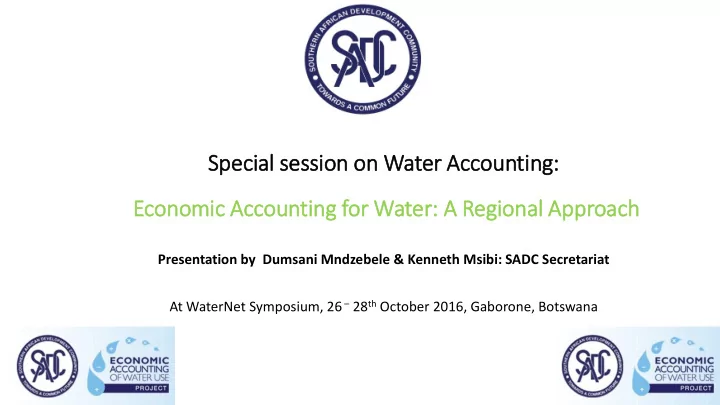

Special session on Water Accounting: Economic Accounting for Water: A Regio ional Approach Presentation by Dumsani Mndzebele & Kenneth Msibi: SADC Secretariat At WaterNet Symposium, 26 – 28 th October 2016, Gaborone, Botswana
Contents of f Presentation • Theoretical Foundation • Water Accounting Framework • Information organizing influence of EAW • The Guiding Philosophy • SADC Model for EAW • RSAP IV focus areas
Theoretical Foundation • River- basin approach as a driver philosophy for RSAP’s contribution to regional integration • Peace and stability through cooperation: regional hydropolitics shaped by this thinking • Transboundary river basins perceived as composites of parts of Member States • Aggregates & disaggregates of national data will be required for river basin accounts • A regional scale hybrid system of Global Water Governance that is blended with Monocentric & Polycentric Water Governance models (Lankfort & Hepworth, 2010) is assumed • A Gradualist approach to institutional development (North, 1990) for EAW is envisioned • Efforts on effective institutionalisation of EAW will result in sustainability of EAW practice • EAW will catalyse unlocking of water potential for regional development
Water r accountin ing in in regio ional l develo lopment: : Co Conceptual l Framework SADC Goals: River Basin Member States Approach Poverty Eradication Cooperation Peace & Stability Unlocking Water Peace and Potential Stability Industrialisation Convincing Economic Argument for water investment Regional Water as Engine Economic Integration for Development Accounting for Water
Info. organising influence of EAW EAW [Nexus info; Industrial VC response, Virtual Water deductions] Agricultural water use
Guiding Philosophy: (Levels (L SADC Cu ls, Cube: Di , Area reas & St Dimensions Stages) Interventions Programme RSAP IV The Focus Goals SADC Treaty RSAP IV RSAP IV CO Sustainability through IWRM & Nexus Approaches CONCEP Water Supply & Governance Sanitation Poverty Eradication CEPTU Energy Security Infrastructure Development Infrastructure Peace & Stability Ecological Water for Water Infrastructure TUAL Industrial Development Development Industrialisation AL FRAMEW Food Security Regional EAW Benefit Integration Safety from Management AMEWORK Water related Disasters Contribution by the SADC Water Sector Programme (Following the Theory of Change) its
The model: Institutionalization of WA (Accounting WGs, intense & sustainable data collection, water accounts development, Entrenched EAW Practice Community of Practice) (Integrative effort, EAW culture, Tools & Products generation and utilisation) Methodologies (Plus intensity of awareness)
RSAP IV IV Focus Areas: • Establish structures for sustainable EAW data collection and analysis • Promote & demonstrate use of EAW tools at MS & RBO levels • Mainstream EAW as a subject in IWRM training at university level (e.g., Waternet platform) • Organize periodic (e.g., annual) forum meetings for water accounts experts=> regional dialogues on EAW & sharing of experience • Undertake water valuation studies in at least two River Basins MS
End of f Presentation For more re info. contact: water@sadc.int
Recommend
More recommend